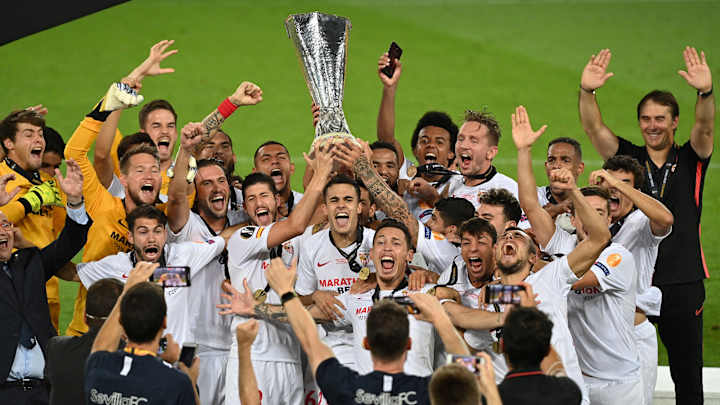Sevilla's Europa League Mastery Continues

With 16 minutes remaining in the Europa League final, a Sevilla free kick was half-cleared. Diego Carlos, with his back to goal and his right thigh heavily strapped, plunged backwards and hooked the ball over his shoulder. It was heading wide, but Inter Milan's Romelu Lukaku instinctively flicked out a foot and, having earlier scored in his 11th straight Europa League game, decided the destination of this season's title with a luckless own goal. To make it worse for Inter and Lukaku, Diego Carlos should have been sent off after three minutes for his takedown of the Belgian striker.
Not that Sevilla would care. Its record in this tournament is remarkable and getting better. Friday's 3-2 victory was its sixth success in six finals, a run that didn’t even begin until 2006. That is extraordinary dominance of a competition that is in its latter stages a knockout affair. What’s even more extraordinary is that at the beginning of this season, Sevilla offloaded 15 players and brought in 14. In leading the club to fourth place in La Liga (and thus qualification for the Champions League) and another Europa League title, manager Julen Lopetegui has restored his reputation after the shambles of his stint at Real Madrid, the appointment that had led to him being sacked by Spain on the eve of the 2018 World Cup.
Sevilla won its latest title the hard way, beating Wolves and Manchester United over the past week before facing Inter, whose run without silverware now stretches back to 2011. Antonio Conte, meanwhile, remains without a European success to his name, and without a trophy may find his future under discussion yet again. His relationship with the Inter board is not a happy one.
But Inter’s immediate frustration will be at referee Danny Makkelie, and his decision not to send off Diego Carlos. As Lukaku broke, Diego Carlos first pulled him back and then trod on his heel to concede his third penalty in three games in the final stages of the competition in Germany.
¡Penal para el Inter! 😱
— TUDN USA (@TUDNUSA) August 21, 2020
Lukaku le gana la posición a Diego Carlos y lo terminó derribando en el área. ¡Oportunidad para los italianos! 👀@sevillafc 0-0 @inter_es#UEL | #Sevilla | #Inter
🔴 En vivo
📺 TUDN | @unimas
📲 Síguelo aquí 👉 https://t.co/bH0RsaDTkY pic.twitter.com/oG1zuaLqzd
Lukaku converted for his 34th goal of the season, nut in truth it should have been worse for Sevilla. It was a cynical foul, not a genuine attempt to play the ball, and therefore shouldn’t have been subject to the double jeopardy law: it should have been a red card. Makkelie, perhaps, will claim that Sevilla players were getting back in the center, but Lukaku was moving into his shooting stride; this rather smacked of a referee swerving a big decision early in his first European final.
That was enough to pitch the game into anarchy. Makkelie didn’t give a penalty as a shot struck Diego Carlos’s hand in the box. The hand was by his side and, although it did twitch slightly toward the ball, given how little time he had to react that was probably the right decision–although it would absolutely have been a penalty this season in Serie A, where the law is interpreted far more strictly. Conte was understandably booked for his protests, but Makkelie then mystifyingly declined to book Lautaro Martinez for a blatant dive in the box. The Dutch official, weak and inconsistent, found himself surrounded after almost every decision. A physical squabble in the tunnel at halftime was the ultimate result.
And, amid it all, a reprieved Sevilla not merely equalized but took the lead with two Luuk De Jong headers. As it had after going behind against Manchester United, Sevilla rallied quickly, and leveled after 11 minutes, with de Jong powering in a near-post header from a Jesus Navas cross. His second came after 33 minutes, a superb back-post header arched back cross goal from Ever Banega’s free kick. Two minutes later, Inter had won a free kick and it was Diego Godin heading in Marcelo Brozovic’s delivery to become the sixth player to score in both a European Cup/Champions League and a UEFA Cup/Europa League final. He had scored in the 2014 Champions League final for Atletico Madrid. It was 2-2, a match almost entirely without structure, bubbling with malice and tremendously good fun.
The second half was only slightly less dramatic, even if it lacked the goals of the first. Even before Lukaku had put through his unlucky redirect, he had missed a one-on-one, denied by Sevilla goalkeeper Yassine Bounou. The look on his face afterwards was that of a man who feared he might be haunted by the miss. As it turned out, worse was to come, a desperately unfortunate end to the season for somebody who until the very end had been exceptional.
At the beginning of the season, it was asked whether Conte could free the club of the Pazza Inter–Crazy Inter–reputation and mentality, the sense that it is drawn inevitably to chaos and self-destruction. Here was the answer: no, he could not, not while Sevilla’s attraction to the Europa League remains as strong as ever.

An accomplished author of multiple books, Jonathan Wilson is one of the world’s preeminent minds on soccer tactics and history.